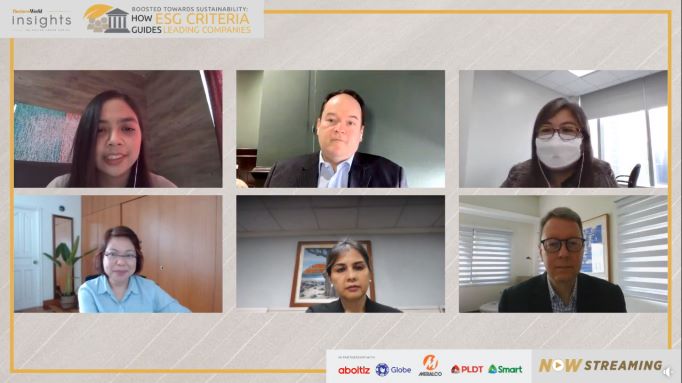Why ESG matters in the post-COVID world

By Bjorn Biel M. Beltran
The COVID-19 pandemic has taken the world by surprise, and through its impact revealed many lingering inequalities, social, economic, and environmental issues that plague modern life. The United Nations Secretary-General has even described inequality as the defining challenge of our era — one that the COVID-19 crisis has thrown into even greater relief.
This is the crux of the massive international movement to address these issues that the pandemic has revealed, and seize the opportunity to “Build Back Better.”
Part of this movement is the growing significance of ESG (Environmental, Social, and Governance) criteria in the operations of the private sector, particularly towards the goal of long-term sustainability. This is the theme of the latest session of BusinessWorld Insights, where experts and industry leaders were gathered to talk about the theme, “Boosted Towards Sustainability: How ESG Criteria Guides Leading Companies.”
Manuel R. Lozano, senior vice-president and chief financial officer of Aboitiz Equity Ventures, opened the talk by presenting their three core pillars of sustainability: People, Planet, and Profit, noting that a strong organization that can withstand wide-scale disruptions such as COVID-19 can only be achieved by harmonizing sustainability and economic prosperity as the purpose of business.
“At Aboitiz, we’ve always believed that we do well by doing good. By doing good, this means not just doing corporate social responsibility and other types of similar projects, but also by managing risks and uncovering opportunities across our whole ecosystem,” he said. “If we do this well, hopefully we become top of mind and become the first choice among our stakeholders. As we grow business, our stakeholders grow with us.”
As with most businesses, the COVID-19 pandemic has affected Aboitiz. Mr. Lozano said that its impact to the company’s stakeholders — its employees, customers, and communities — made them rethink their way of doing things. As a result, Aboitiz has doubled down on its environmental sustainability goals, including reducing its carbon emissions, improving resource efficiency, waste management, and making more renewable energy investments.
“Part of the commitment we’re making is a defined governance structure on addressing climate-related risks; defining key strategies, targets, and metrics on our climate actions; and improving disclosures to provide clear and reliable information to our stakeholders. In other words, transparency across all of our activities,” he said.
Tying together purpose and profit
ESG criteria, or the set of standards for a company’s operations that socially conscious investors use to screen potential investments, is intrinsically linked with the core of one’s business.
Marla Garin-Alvarez, vice-president for sustainability at BDO Unibank, said that banks play a critical role in providing the financing and the expertise to businesses for them to achieve new and more sustainable economic business models. As such, much of the focus for BDO’s long-term sustainability is built towards resilience, including environmental resilience.
“If we fail to effectively address and mitigate accelerated climate change now, it could cost us so much more. A cost-intensive quality of life, intensive on our resources, and our very existence in the future. ESG is a journey that BDO Unibank and its subsidiaries has been pursuing for several years now,” she said. “Businesses cannot succeed in a society that fails. You cannot do business on a dead planet.”
Melissa V. Vergel De Dios, head for corporate sustainability and investor relations at PLDT, shared that for PLDT, the company’s various sustainability programs are centered around environmental, societal biodiversity, and financial inclusion goals, targeted towards issues like energy efficiency, cybersecurity, and data privacy for social impact, diversity and inclusion, connectivity for marginalized communities, and using technology for biodiversity.
“Everything starts with one’s purpose. Our approach is to leverage connectivity and technology to support our sustainability initiatives,” she said.
“Sustainability is a journey, a continuing work-in-progress and should be tightly linked to the business. It is not a competition. It is about doing our part to achieve a common objective as stewards of this planet for the next generation. We need to be able to engage with our stakeholders and have a conversation about what these scores mean.”
Similarly, Yoly Crisanto, senior vice-president for corporate communications and chief sustainability officer at Globe, said that Internet connectivity has become such a critical part of society that the long-term sustainability of Globe relies naturally on their infrastructure. Through internet connectivity, the company can provide access to affordable education and health services like Globe’s partnership with telehealth service KonsultaMD, making it possible for Globe subscribers to get unlimited access to licensed medical professionals anytime, anywhere.
She added that that purpose is the core of a company’s long-term impact. The frameworks and reporting standards are not so important compared to it.
“It’s all about the impact. You don’t want barriers to sustainability practices. You want everybody to participate. Sustainability requires the whole of the country, not just corporate and the private sector. The public sector also has its role,” she said.
“At the end of the day, it’s how you take care of your stakeholders, your business, and the planet. This is for us and future generations. Sustainability is not philanthropy. In the end, it all goes back to your business,” Ms. Crisanto added.
Timothy Daniels, head of investor relations and consultant at SM Investments Corporation, said that the SM Group’s sustainability journey grew from a vision of building an ecosystem of businesses that are catalysts for responsible development. He also added that for companies that are thinking of pursuing that journey, the United Nations Sustainable Development Goals is a good place to start.
For instance, SM Group focuses on six of the UN’s Sustainable Development Goals: decent work and economic growth, sustainable cities and communities, climate action, good health and well-being, quality education, and partnerships for the goals.
“Start out by identifying what is material for your business, and that will guide you to where your focus should be. Sustainability is not about frameworks or metrics. It’s what we need to do to be here in a hundred years’ time,” he said.
This session of #BUSINESSWORLDINSIGHTS is made possible by Aboitiz Group, Globe, Meralco, PLDT, and Smart.



